subsuming present creations with the light of the next: notes from Hutchmoot UK 2023
A few days of fellowship and fervent engagement with art, truth, and light.
“Do ants grieve?”
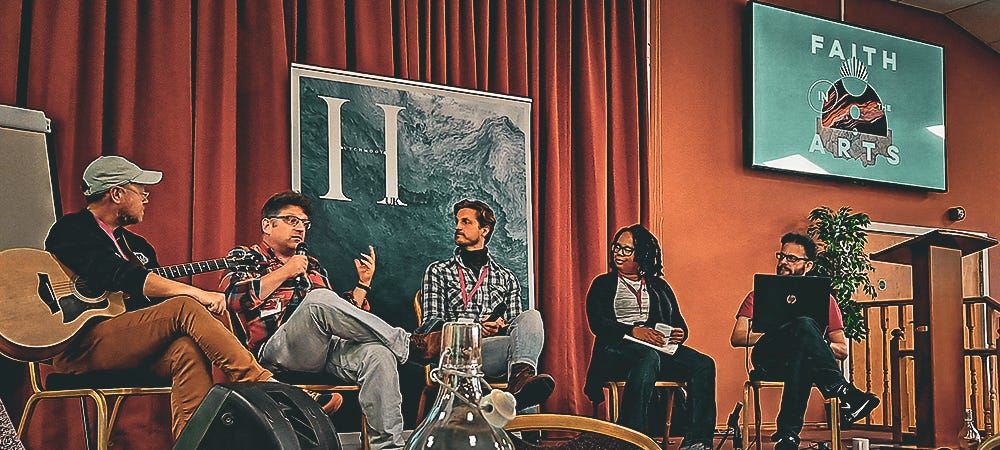
Hutchmoot is the unicorn of conferences. It’s Christian and artsy, rigorously engaging and somehow relaxed. As one attendee said during the last day’s feedback session, “The vibes are right” (not an exact quote, but that’s the gist). It’s quite a feat to assemble an event with such candor and unpolished excellence—one that inspires and arouses without a hint of manipulation or excess urgency. And I’m incredibly grateful to The Rabbit Room, Mark Meynell, the Hayes Conference Center, and unnameable others for gifting us creative- and creation-minded individuals a space to nerd out about art, storytelling, faithful living, and why God asked Adam to take a look at all the animals if he already knew there wouldn’t be a suitable companion for him found among them. (It’s Nate Morgan Locke’s fault.)
It was a thrill seeing many friends from Hutchmoot Homebound and Oxford last year in person once more! And meeting many new friends who are interesting and curious and thrillingly creative.
The past three years at Hutchmoot I’ve taken notes, trying to capture insights and pointers for application to my creative pursuits and the art forms I engage with. Except for what I’ve shared in the UK Moot discord, those notes remained in my notebooks, but I did return to them again and again, seeking mites of recall when the need arose.
As with last year in Oxford, my only complaint is that Hutchmoot offers up so much goodness simultaneously that it’s impossible to eat everything one wishes to eat. So I had to pick and choose. Oh, the torture! Here’s a brief read-out of what stuck with me from the sessions I attended.
The Darkness is as Night to You: Christianity, Horror, and Stephen King (w/ Andy Patton)
The deep end is the only place to start. I learned some interesting things about King, his life, and his storytelling philosophy, especially that horror isn’t about the frights but what the frights represent. Andy argued that people are attracted to horror because a numb culture desires sentimentality, and horror is an effective commodity. It makes sense: a cold, cynical society begs to feel something, anything. Horror delivers that feeling. The horror genre also delivers a function of fantasy—connecting our speculative fears, dreams, and desires with real ones.
I’m adding Stephen King’s Dance Macabre and On Writing to my reading list.
How Rap Can Enhance Your Storytelling & Poetry Writing (w/ Jonny Mellor & Joel Wilson)
No lie: I was surprised to see two sessions on rap and hip-hop at Hutchmoot. (Close your eyes and imagine Andrew Peterson and Kendrick Lamar sharing a stage.) I went to both of them. Jonny and Joel are so obviously in love with the genre and the culture. And Jonny was one of the people I remember wanting to speak with more last year but didn’t get the chance, so it was great to hear from him at length.
This session was a showcase of artists and lyrics, along with pointers on: (1) what’s happening with the wordplay, (2) how to use those skills in one’s own writing, and (3) how to listen well to hip hop and rap. We must accept rap’s power to overwhelm with a “word feast” and acknowledge the artist’s need to get it all out. Rap is usually fast-paced and rich with referents: we shouldn’t worry so much about understanding a song as sometimes it’s good to go away and think about it for a while.
Here’s a playlist Jonny and Joel put together from this session.
And some takeaways for the writers in the crowd. These pointers apply for prose just as much as poetry.
Let comedy and tragedy intertwine
Find a unique perspective
There’s power in repetition and contradiction
(Sometimes) embrace a word soup absurdity
Faith in the Arts LIVE (w/ Jonny Mellor, Marlita Hill, and Alastair Gordon)
This was a live recording of a future Faith in the Arts podcast episode. Jonny, Marlita, and Alastair each lead a collective (fellowship? community? friend group?) for artists with Christian concerns. And the first half of the conversation was about: (1) why artists need community, (2) if the myth of the lone artist-genius holds water, and (3) (most importantly) what to call the communities that artists form.
The bottom line: every artist needs some form of community, inclusive of the three gears that make the art machine go—seen below in my nifty diagram.
Integrating Imagination and Reason (w/ Marsh Moyle)
This was one of my favorite sessions because Marsh listed about fifteen definitions for imagination and another fifteen for reason and then said, okay, guys, think up some more. We had nice sidebar conversations resulting in unique ways of talking about these important but sometimes seemingly opposite faculties of the human experience. I think imagination is like a pond with a pebble dropped in.
Questions we ask:
Pertaining to the imagination… Is it true? Or, what does it do in my head? Does it make sense?
Pertaining to reason… Is it real? Or, will it support me if I lean on it?
Other points Marsh made:
The arts vs. science dichotomy isn’t entirely true because we can’t do science without the art of the imagination.
Someone defined imagination and reason as tools—we can pick them up and use them, or not.
The imagination provides depth perception, the collusion of the eye of memory and the eye of the heart.
When we use reason without imagination, we mistake the menu for the meal. (It sounded better when Marsh said it.)
This is the mind-bender: God creates chaos and then brings order out of it, naming the elements of the chaos and calling them good. Chaos to Creation is the perfect blend of the imagination and reason. 🤯
50 Years of Hip Hop History (w/ Joel Wilson and Jonny Mellor)
I want to get better at thinking about music (and hopefully writing about music), so I was very interested in this session. It was essentially an overview of the history of hip hop—from its Bronx roots to the global cultural phenomenon it is today—something I will not attempt to recap. I did take photos of the highlights from each decade of the genre’s spread and will be methodically diving into the discography of artists I’ve never listened to.
And here’s the accompanying playlist Joel and Jonny put together for this session.
Evoking Transcendence, Avoiding Propaganda (w/ Mark Meynell)
This one tackled building bridges between people who don’t speak the same language or have the same vocabulary—especially between the religious and secular realms. Here’s what jumped out at me.
Do ants grieve? This is a real question posed by Mark Meynell. It jumped out so much I don’t recall the context. But it has stuck with me; it deserves to be pondered.
‘Truth isn’t anti-rational; it’s a-rational—it’s bigger than reason.’ (As direct of a quote as I can recall.)
We don’t see spiritually because of the ‘lethargy of custom,’ ‘the film of familiarity,’ and ‘selfish solicitude.’ (Words of Samuel Taylor Coleridge.)
The artist sees. Others say what it means.
The artist (the seer) turns a non-thing into something—the thing becomes bodied. It is, whereas before, it wasn’t. The artist bodies forth.
Riotous language is good because it can lead to confrontation.
Fresh language is better than oppressive cliches.
The moment the transcendent meets the physical, language breaks down. 😭 This is something I wrote about in the post below.
Mythopathic: Made for Story (w/ Nate Morgan Locke)
Calling yourself a “reformed mythologist” is as cool as it gets. Nate Morgan Locke regaled us with the story of Anansi getting his stories from the sky-god and then the ‘first complete narrative in Scripture’—God deciding it wasn’t good for Adam to be alone and creating Eve. Interesting stuff about storytelling not being ‘a reward of redemption, but a gift of creation.’
We are mythopathic beings, story-receivers and story-reactors.
What is the impact of the Fall on storytelling?
Conflict before creation implies conflict (or the recounting of conflict) in the New Creation. 👀 (This ties in with one of Marsh’s conclusions noted above.)
I’m definitely following Nate everywhere online now because some of his stuff I have to think about more.
New Creation Imagination (Keynote w/ Alastair Gordon)
“There is nothing more truly artistic than to love people.” —Vincent Van Gogh
We often talk about the benefit of a Christian imagination, which is a good thing, but a new creation imagination draws its inspiration from a vision of the world to come. Drawing on several passages of Scripture (2 Cor. 5:7, 2 Cor. 10:5, Psalm 73:7, Isaiah 65:2, Eph. 1:18-21, 1 Cor. 2:9) and the life and work of Van Gogh, Alastair helped us think about how we can subsume our present creations with the light of the next creation.
Imagination is not only the function of the heart, but the function of the gut. It’s something incarnate, embodied, fleshy.
Imagination is the result of sight, leading to memory, leading to invention.
God not only calls his creation good, but good and beautiful (the full definition of the Hebrew word towb, usually translated only as ‘good’).
In Genesis 2:9, the trees were first “pleasing to the eye” and then “good for food”—aesthetic first, then function. But in Genesis 3, after the Fall, function comes before aesthetic: Eve sees the Tree of Life as “good for food” before she sees it as “pleasing to the eye.” 🤯
We must attend to “the aesthetic dimension of creation.”
Narnia: The Monsters and the Skeptics (w/ Simon Horobin)
I couldn’t leave Hutchmoot without attending a session focused on my favorite writer and favorite series of books. Simon set up a debate between Tolkien and Lewis and their differing ideas of how to portray dragons and sneak past watchful ones via fiction. The aim was to help creators think of how best to sneak past the watchful dragons of our society, especially the ideas that sin isn’t real and that we don’t need salvation. The talk brought up some interesting questions for future pondering:
What sort of people does allegory work for (or on)?
How do we feel when the watchful dragons have been snuck past and the story has the opposite of the desired effect?
I collected the titles of a handful of dragon-related stories I want to read.
That’s all for now. I hope these thoughts provide a jumping-off point for future meditation and creative endeavours.
Good luck and Godspeed as you get to work!




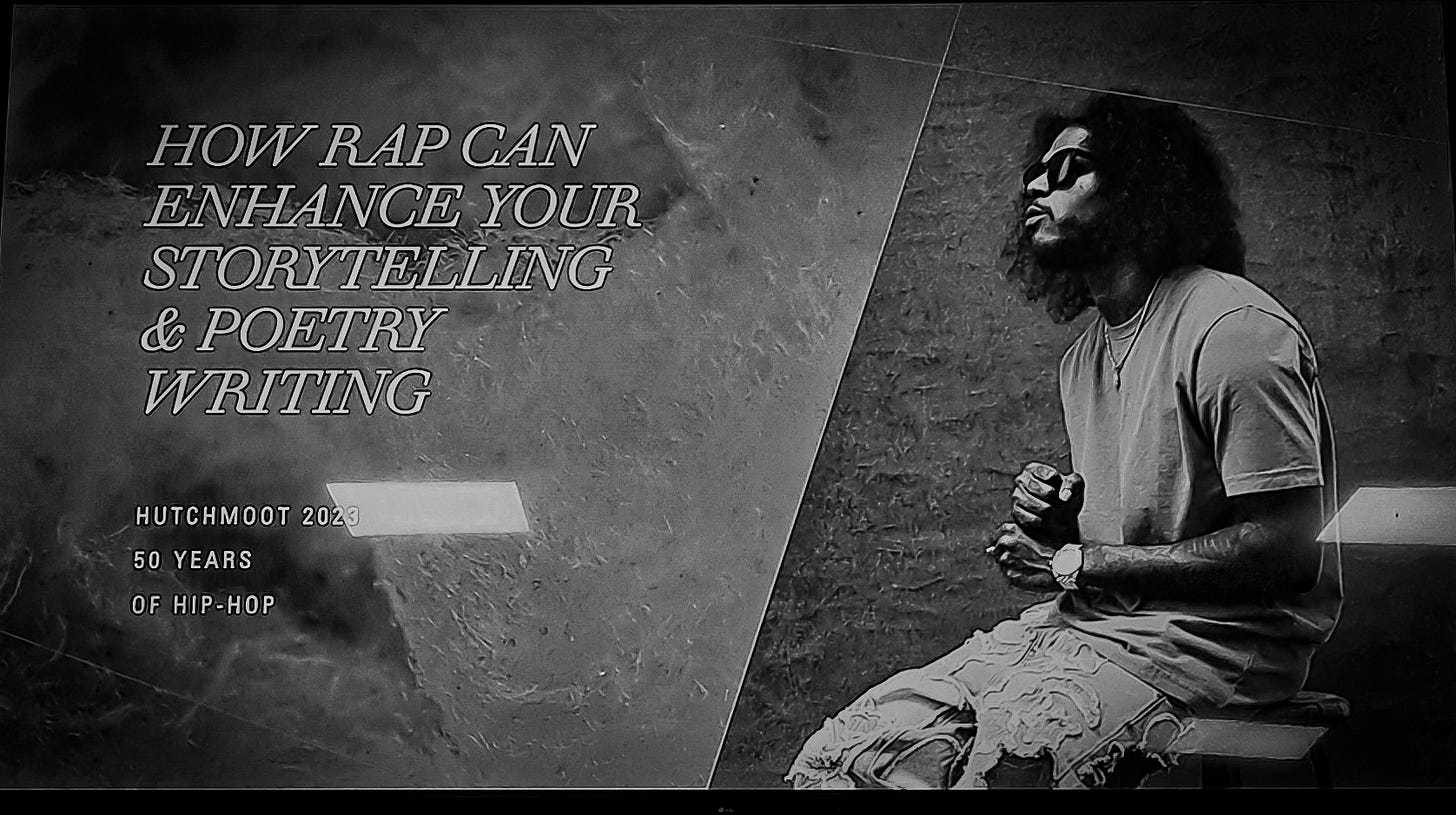
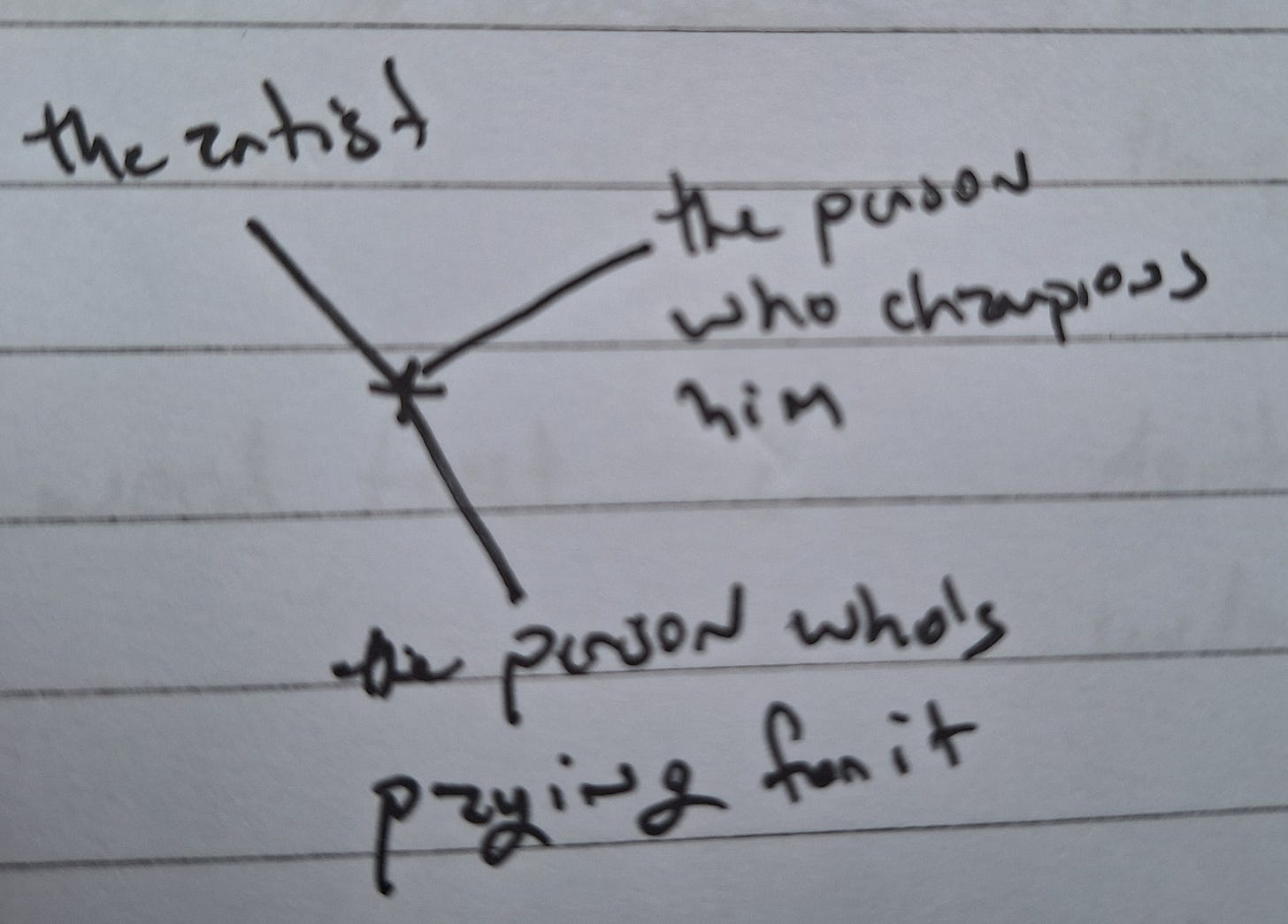
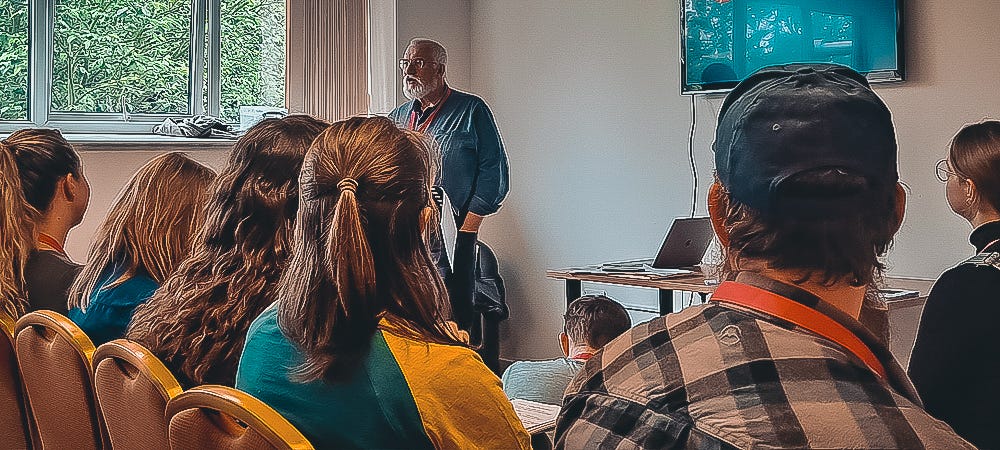
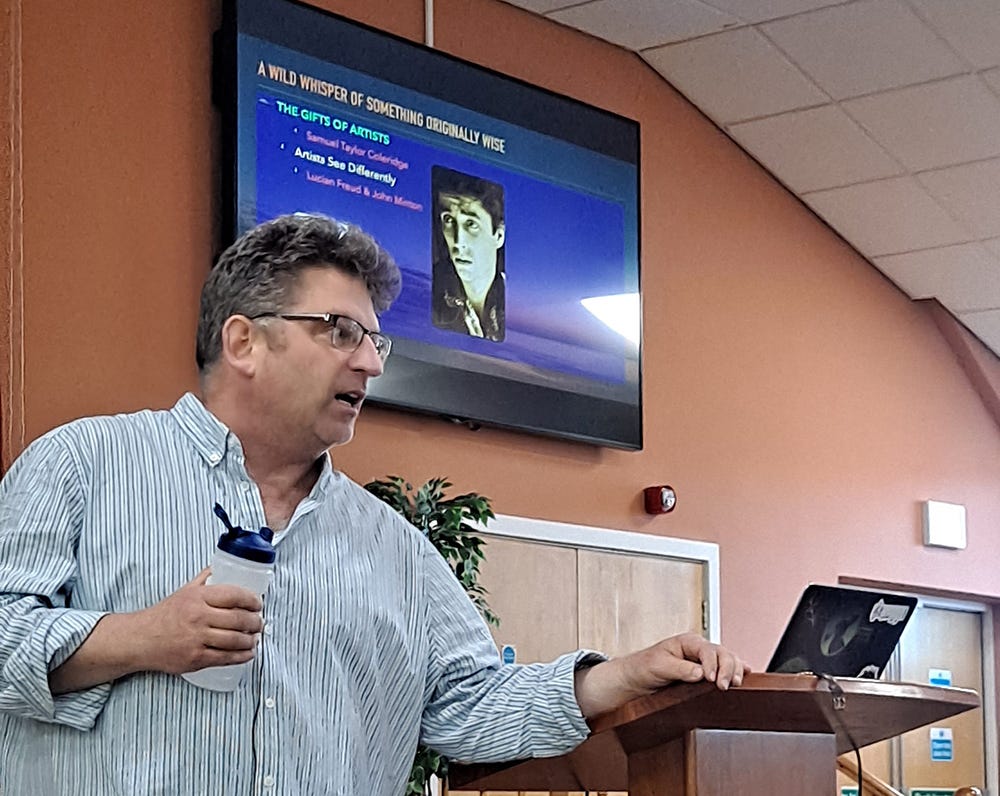

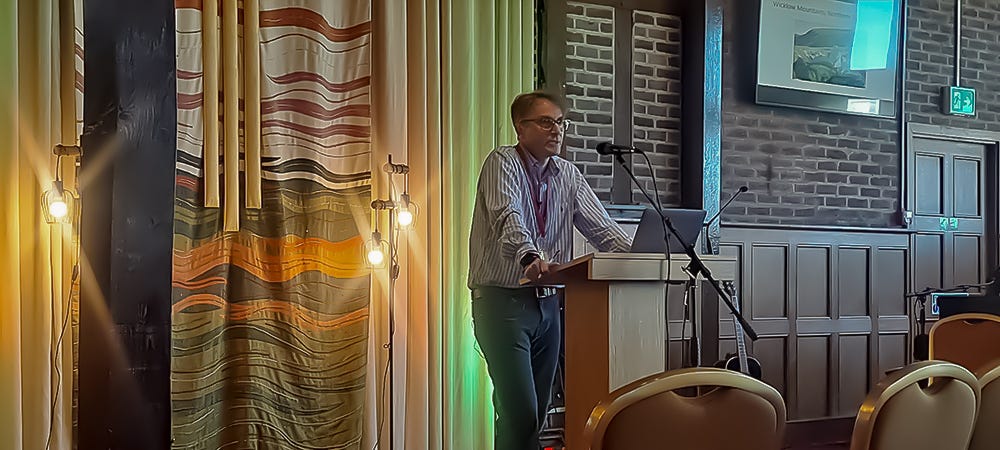
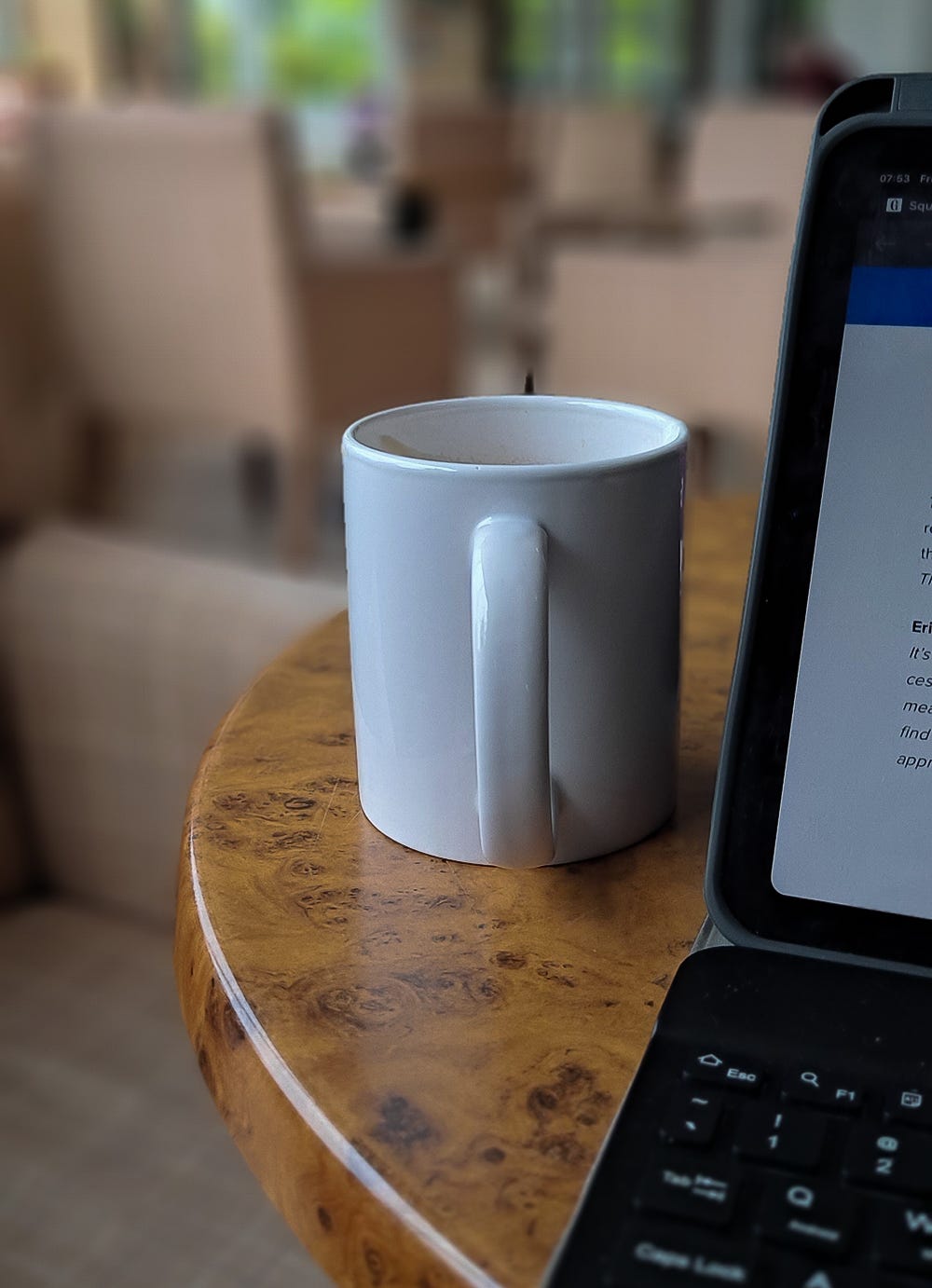
Also, thanks for a peak inside your brain. It’s always fun to see who went to what and what they went away with. You were definitely more attuned to Simon Horobin than I was!
Great recap! And thanks for the playlists. I tried to write down all the songs/artists mentioned in the Hip Hop overview but I missed a few.